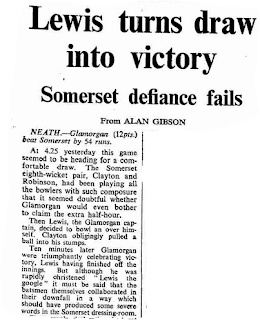It was a week off for Kent, in Championship terms at least,
though the first half of the week was occupied by a game against the second
touring side of the summer, the Pakistanis. Unlike the earlier game against the
Indians, the opportunity was taken to rest three bowlers: Graham, Sayer and
Dixon. David Nicholls came in for his first game of the season. A punchy
left-handed batsman, Nicholls started with a roar in 1963 with a double century,
but had not reached three figures since. He made a duck in his only innings in
this match and might have been contemplating the possibility that this would be
his last season, but an opportunity for a change of role was about to present
itself that would keep him in the game for another 13 years.
Majid Jehangir scored a century for the tourists. We know
him better as Majid Khan and he was to make another hundred in the second half
of the week, against Middlesex. John Arlott-Silchester described him there as a
“pleasantly extrovert batsman”. Unfortunately, Majid also opened the bowling,
revealing that Pakistan would be no more able to field an opening attack of
test class than India had been. At Lord’s Eric Russell and Mike “Pasty” Harris
rattled up a Middlesex first-wicket record of 312 against them. The most
significant action of the game at Canterbury was a breezy 41 from Majid’s new
ball partner, one Asif Iqbal. That day may have been when the idea germinated
that here might be a player who would enhance the Kent team and please its
crowds when the overseas player rules were liberalised for the 1968 season.
Majid Khan became as popular at Glamorgan as Asif Iqbal
was to be with Kent. They could have done with his strokeplay to liven up proceedings
at Neath this week. As was so often the case, Alan Gibson’s report contained
more to please than anything that happened on the field of play.
On this occasion the Glamorgan secretary Wilf Wooller did
not take to the public address to offer spectators their money back as he was
to do on a later occasion when Brian Close was captain of Somerset. The game
looked a certain draw when Tony Lewis put himself on and won the game with a
little filthy legspin.
The big match of the week was at Grace Road where Championship
leaders Leicestershire hosted second-placed Yorkshire, who reclaimed what
everybody from Middlesbrough to Sheffield believed was their rightful place on
top of the table. Ray Illingworth took 11 in the match to follow 14 over the
first two tests, though John Woodcock was about to describe him as having a “limited
future” as a test cricketer. Mike Brearley is the standard example of a player
picked as a captain rather than on his own playing merits, but Illingworth
would do just as well. Leicestershire were to wait another eight years for
their first Championship, led by Ray Illingworth.
John Newcombe became the last amateur men’s singles
champion at Wimbledon with an easy victory over Bungert of Germany. The men’s
final was always played on a Friday in those days, with Ann Jones to play
Billie Jean King in the ladies’ final on Saturday.
The first News at
Ten was broadcast on ITV on 1 July 1967 presented by Alastair Burnet and
Andrew Gardner. This was the first nightly news programme that had the space for
longer reports and analysis, with journalists, rather than announcers, as
presenters. It began the golden age of ITN during which it set the style of
British TV news with the BBC catching up as best it could.
Of course, news and current affairs were regarded as altogether
different things then, and the BBC still had the lead in the latter field.
Panorama was presented by Robin Day with a reporting team that included Richard
Kershaw, James Mossman and Michael Charlton (who had been the guest Australian radio
commentator on the 1956 Ashes series). The nightly Twenty-Four Hours programme was delivered by as rich a collection of presenting
and reporting talent as there has been in a British current affairs show: Cliff
Michelmore, Ian Trethowan, Robert McKenzie, Kenneth Allsop, Julian Pettifer,
Fyfe Robertson, Michael Barrett, Leonard Parkin, and even the young Michael
Parkinson (it was of Fyfe Robertson that Clive James once wrote “he described himself
as an intelligent man in the street, which he proved half right by standing in
a street as he said it”).
The reviewer of the first News at Ten in The Times
was Michael Billington, also deputy to Irving Wardle as theatre critic. In 1971
Billington became the Guardian’s theatre critic, a position in which he serves
still. Few have spent the half-century more enjoyably than Michael Billington.
This week, Leo Abse’s private member’s bill that decriminalised
homosexual activity between consenting males over the age of 21 completed its
passage through the House of Commons. It was read a third time at 5.50 am after
eight hours of filibustering from the backwoodsmen, mining deep into their
considerable reserves of malice and ignorance to keep proceedings going. Some
of these splutterings might seem amusing now, but this week in 2017 here in New Zealand
the House of Representatives passed a motion of apology to those men convicted before
our law was changed, almost twenty years later than in Britain. The debate reminded
us that thousands of decent men lived their lives in secrecy and fear because
of the kind of ridiculousness that these fools expounded. So not funny at all.
Even Roy Jenkins, the epitome of the liberal Home
Secretary whose initiative the bill was and who ensured that it was given
sufficient parliamentary time to pass, referred in his third reading speech to “those
who suffer from this disability” showing that the passing of the bill by the Commons
was a beginning not an end.



No comments:
Post a Comment